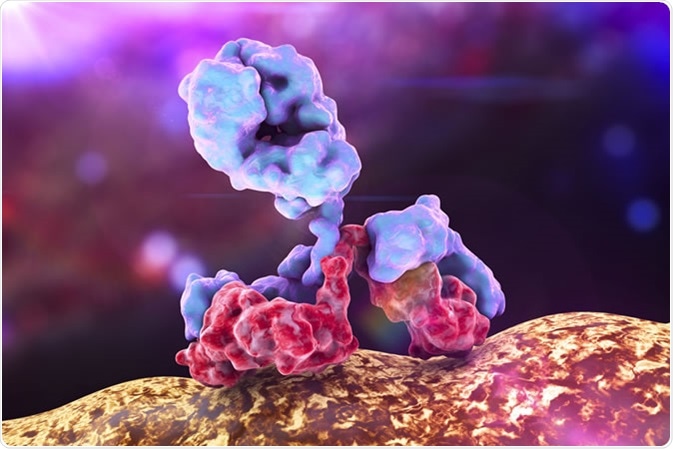Skip to:
Experiencing an unwanted reaction such as skin rash or breathing difficulties when eating any type of food often causes people to conclude that they have an allergy to one of the ingredients. When this happens the body has released Immunoglobulin (IgE) antibodies to combat what it perceives as a threat. These antibodies are the immune system’s reaction to potential danger.

Antibody attacking bacterium. Immunoglobulin, 3d view. Image Credit: Kateryna Kon/ Shutterstock
Research into the biological mechanisms of allergies indicates there is a complex interplay between factors such as genetic predisposition and environmental influence.
However, considering the process of allergy development, there is one more interaction that needs to be taken into account: the interplay between mind and body. The results of this interaction are referred to as psychosomatic.
The question of whether some allergic reactions are psychosomatic is an important one;it is vital that someone experiencing very real physical reactions can identify the true cause of their symptoms.
Psychosomatic food allergy: a case study
A case study from 2003 revealed an association between the body and the mind. An allergy to peanuts is one of the most common and life-threatening allergies. The study described a patient who believed they were allergic to peanut butter but whose reaction proved to be psychosomatic. After an incident of consuming peanut butter and experiencing symptoms such as itching and breathing difficulties, the patient presented for clinical evaluation. Skin pricking tests were negative. Upon these results, a double-blind experiment was conducted where the patient was exposed to peanuts. In a double-blind experiment, neither the participants, not the researchers are aware of which condition the participants are exposed to. The patient did not show any of the physical symptoms that they had experienced previously. This led researchers to conclude that in this cases the physical reaction was psychosomatic. That is, the reaction was caused by the patient’s body responding to their mind’s conclusion that they are allergic to peanut butter.

Skin prick allergy test. Image Credit: Microgen / Shutterstock
The discrepancy between proven and imagined or suspected allergies poses a risk of misdiagnosing a true allergy, which can be detrimental to one’s health. One of the most dangerous allergic reactions is the one towards local anaesthetics (LA). The spectrum of symptoms includes respiratory distress and loss of consciousness.
Recent research has shown that in some cases non-allergic mechanisms might be the cause of these reactions. The histories of over 400 patients with LA reactions were analysed. A small number had a history of actute hives after LA and the rest had subjective complaints including, neurological, cutaneous, respiratory and cardiovascular symptoms. Half of these were identified as acute psychosomatic reactions to the administration of LA and after testing the researchers found only 0.5 percent of the study group had results consistent with an allergy.
Parents’ Anxiety Contributing to the Development of Food Allergies
Research suggests that early exposure when a child -- around 6-months of age --during the breastfeeding period, can protect the child from developing allergies later on in life.
The increased incidence of allergies recently has led to the incorrect use of the term “allergy” by the general public.
Allergies have been referred to as any unfavourable response to foods. Research in the UK recorded that 31% of parents perceive any food intolerance by the child’s first year and this number increased to 34% by the time the child turned 3 years of age.
Avoidance of food or any other type of potential allergen should be based on clearly defined criteria and only after appropriate allergy testing has taken place. The fear of allergies that parents might experience may prevent the complementary feeding of the child.
A potential problem with avoidance of ingredients perceived but not proven dangerous is that it can potentially lead to a higher chance of developing food allergies later on in life.
Research shows that delaying food introduction can be the cause of the development of food allergies.
A study conducted in 2008 compared the prevalence of peanut allergy in Jewish children in the United Kingdom and Israel. Results showed that peanut allergy was more common in children brought up in the United Kingdom. The main difference in the children’s diet was that children who grew up in Israel consumed higher quantities of peanuts earlier in life and at a higher frequency.
A Swedish cohort study supports these claims: eating fish before 1 year of age was linked to a reduced risk of fish allergies and intolerance.
A statement made by the Canadian Pediatric Society in 2013 suggests that there is no benefit of delaying the exposure of potential allergens such as milk, peanut butter, eggs and fish beyond 6-months of age as a way to prevent food allergies.
Conclusion
Though food allergies can be both distressing and cause a large inconvenience in people’s lives, adequate allergy testing should be completed before any conclusion is made.
Psychological factors such as the perception of food allergies should be taken into account as many psychosomatic symptoms lead people to conclude that they have an allergy. Moreover, restricting children from eating “potential” allergens is not a scientifically accepted practice and in the event of a perceived reaction to a particular food proper medical testing is necessary to confirm a genuine allergy.
Further Reading
 Researchers develop a lateral flow test to reliably identify and quantify allergens in foods
Researchers develop a lateral flow test to reliably identify and quantify allergens in foods